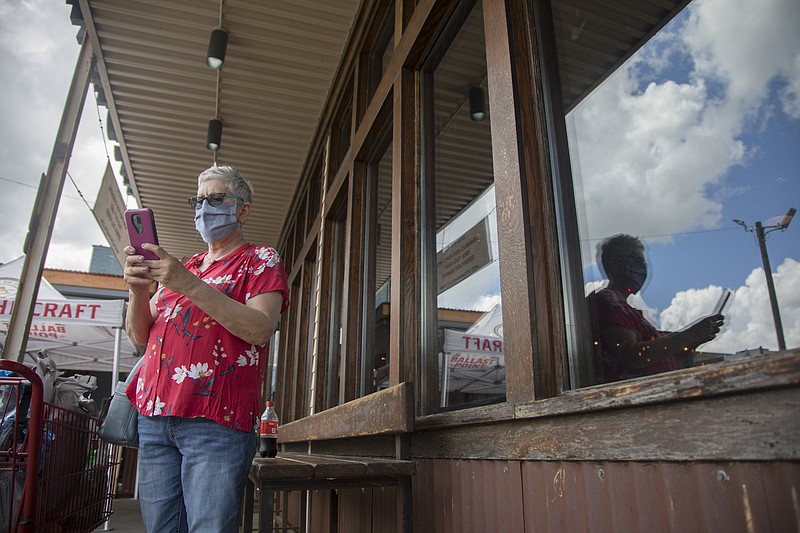Tennesseans are among the least likely in the United States to wear face coverings - one of the few tools known to help stop the spread of the coronavirus - according to a report released last week.
The lack of adherence to the mask guidelines comes despite infection of more than 36,000 people in the state, and at least 542 deaths in three months.
Researchers at the University of Washington's Institute for Health Metrics and Evaluation found that while face mask use increased globally and in the United States between April 26 and June 13, face mask compliance in Tennessee declined.
In April, 20% to 30% of Tennesseans said they always wore a face mask when going out, compared to 10% to 20% who said the same in June. Indiana and Arizona were the only other states with the same low level of face mask use as Tennessee.
In Georgia, 30% to 40% of people said they always wear face masks - an increase from April. Face mask use in Alabama decreased during the same time frame but is still higher than Tennessee, with 20% to 30% of the population reporting wearing face masks in June.
Authors of the report reviewed more than 20 studies and ran a meta-analysis, revealing that mask use varies worldwide. Whether cloth or medical grade, masks can reduce the risk of respiratory illness such as COVID-19 by 33% or more.
The findings come as the state's top health official said during a media briefing on Tuesday that half of Tennessee's COVID-19 cases are now coming from unknown sources, meaning that community spread is occurring at least in part as a result of reopening businesses and public spaces.
Dr. Lisa Piercey, Tennessee health commissioner, said that earlier in the pandemic most people were infected by someone they knew, primarily household contacts or coworkers. But now, 50% of cases in the state cannot be traced.
"As people are moving about in the community, they come into contact with people that are sick that they're unaware of. But this unknown source tells us we have more community spread," Piercey said.
On Friday, the Tennessee Department of Health reported 1,188 new cases of coronavirus - a single-day record for new cases - and Piercey said that the new case daily average over the last 14 days grew to 615, up from 453 during the prior 14-day period.
Experts say mask wearing is key to slowing transmission, especially as society relaxes social distancing, because respiratory droplets harbor infectious virus particles that the eye can't see, and COVID-19 can be spread by people who show no symptoms.
Piercey was not questioned about the University of Washington report but acknowledged the importance of face masks in an interview after the briefing.
"We really want to encourage personal responsibility and let everybody make the decision for themselves, but want to remind everybody that wearing a mask is just as - if not more - effective than hand washing," Piercey said in an interview after the briefing. "I acknowledge it's a bit more inconvenient, particularly in the summertime when it's hot and everybody's sweating, but it really is one of the most effective things you can do. So finding a mask that fits you well and that is comfortable and that you're willing to wear, even if it's got your favorite brand on it, that's what's going to be most important."
Becky Barnes, Hamilton County health administrator, said during a separate, local news conference Tuesday that "face coverings are probably as effective as a shutdown."
"That is one of the best measures that we have," Barnes said. "Because with face coverings, you can go about and have some semblance of normalcy in our community instead of having to consistently stay home."
The Hamilton County Health Department's COVID-19 hotline has received complaints from patients who visited medical offices and reported that face masks were not being worn and distancing not being practiced in waiting rooms, according to a news release issued Tuesday.
"All businesses that offer a waiting room are strongly urged to follow the Tennessee Pledge guidance that people in waiting rooms should wear facial coverings and maintain a minimum of 6 feet of distance from others," the release states.
Although some states and municipalities require people wear face masks in public places, Tennessee and Hamilton County officials thus far have opted for that decision to fall on individuals and businesses.
Gov. Bill Lee has not mandated safety measures for employers, instead calling on them to take the pledge to voluntarily follow unenforced state safety recommendations.
Meanwhile, Hamilton County has doubled its number of coronavirus-related deaths in the past month, reporting its 29th on Tuesday, when health department officials said a female Hispanic child under the age of 10 with no underlying medical conditions had died.
Local officials acknowledge COVID-19 was spreading in Hamilton County in part because of the reopening of businesses about two weeks ago.
Contact Elizabeth Fite at efite@timesfreepress.com or 423-757-6673. Staff writer Andy Sher contributed to this report.
